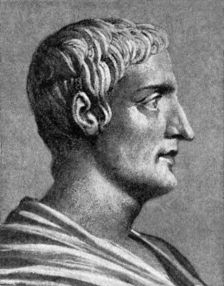
Agricola is where we meet Tacitus the man rather than the historian. As a tribute to his deceased father-in-law it is a very personal expression of love and grief. But, in true Tacitean fashion, it also brimming with rage at the corruption of monarchy and the moral decay of the empire. Agricola was one of Rome’s great generals, a model of old fashioned Republican era rectitude. His achievement, in 83 CE, was to complete the conquest of Britain by defeating the peoples north of the Forth-Clyde line; his misfortune was to excel at a time when glory was reserved for royalty. The emperor Domitian, jealous of his success, recalled him the following year, and Agricola found himself caught on a kind of Morton’s Fork. He was modest about his achievements, and had no concern for personal glory; but the more he shunned public praise, the more popular he became. Domitian, simmering, quickly abandoned the territories his general had conquered, and on the subject of Agricola’s death some years later, Tacitus all but accuses the emperor of murder by poisoning.
Tacitus is not detached. He worked under Domitian himself and saw many of the best men of the senate, those who dared defy the emperor, judicially murdered. His career during that period must have been ridden with humiliation and fear. But the thesis of Agricola is that it is possible for good men to live under bad rulers, and that martyrdom, while heroic, does not necessarily benefit the commonwealth. This theme of pragmatism in evil times is one that resonates through the history of the Roman empire, and through history itself. Andrew Marr, in his recent A History of the World, writes of ‘a kind of bravery that we perhaps make too little of, the bravery of the gritted-teeth survivor, the man who bows his head and keeps going without ever quite grovelling, always keeping his eye on what he believes to be essential.’ These words are a tribute to Deng Xiaoping, whom Mao persecuted and called ‘the little man’, and whom Marr believes may be the most influential figure of the late twentieth century. I like to think Deng knew his Agricola.

On another level, Agricola is of interest for its descriptions of first century Britain – ‘The climate is miserable, with frequent rain and mists’ – and its subject peoples, who ‘have now been broken into obedience, but not yet to slavery’: this written with the Boudiccan revolt in living memory. Tacitus wrongly believed the Caledonians to be of German stock, but they do embody all the unspoilt courage that he ascribes to the Germans. This is not some rhetorical ploy to inflate Agricola’s victory over them: Tacitus is absolutely sincere in his admiration for these enemies of Rome. He concocts a magnificent speech for the Caledonian leader, Calgacus, on the eve of the Battle of Mons Graupius. It contains that famous blast at imperialism: ‘They make a desert and call it peace,’ and the oratory is so wholly admirable, so full of love and dignity and valour, that Tacitus actually has us rooting for the barbarians. They lose of course, cut up by Agricola’s auxiliaries, while the legions stand by and watch.
We ought to be sceptical of hagiography – the lists of Agricola’s noble qualities are extensive; notable faults he seems to have had none – but we ought also to be impressed by the love Tacitus clearly felt for the man. It shines from the pages. It is instructive of Tacitus’ nature that he expresses this love by telling us how well Agricola served Rome. The modern reader might ask why Agricola bothered to subdue Caledonia, there being nothing there, and why he would then contemplate crossing another sea to invade Hibernia (modern day Ireland). Tacitus doesn’t pose these questions, since to him the answers are self-evident: The land is to be conquered because to do so augments the security of the empire and the glory of Rome. Agricola’s seven-year governorship of Britain was, by Tacitus’ lights, exemplary. In the summer campaigning seasons he applied the stick – consolidating Roman authority and pushing back its boundaries by force. In the winters he served up the carrot – alleviating the tax burden, stamping out corruption, improving amenities and services; civilising.
Agricola is the earliest extant work of Tacitus, but already he shows his mastery of the withering epigram. The Britons are like the Gauls, he writes, showing ‘the same boldness in seeking out danger – and the same timidity in facing it.’ On the fabled British pearls that never materialised, he finds it ‘easier to believe that the pearls are lacking in quality than that we are lacking in greed.’
But in the end, tender emotion outweighs the cynicism. His quiet description of his and his wife’s grief at the death of Agricola is extremely affecting. They were absent at his passing, somewhere far from Rome, so they were unable to comfort him and hear his departing words to them, utterances that Tacitus would have held very dear. This written tribute is also, in part, Tacitus’ restitution for the funeral oration he was unable to make. Agricola in its entirety fills barely thirty pages, but ounce for ounce, it ranks with the greatest of his work. It contains so much, but its clearly-stated purpose is simple: to ensure the survival of Agricola’s memory. Good son-in-law.
The edition reviewed is the Oxford World’s Classics, translated by A.R. Birley, 1999. Also included in the edition is Tacitus’ ethnography, Germany, which will be reviewed at a later date.

Reblogged this on Writers Riding and commented:
G Julius Agricola was honored by Tacitus and his praise.
LikeLike
I too agree with you on Tacitus’ praise of his father in law. Well deserved. I’ve been working on Agricola’s story for fifteen year and finally have my story coming out in January. I just hope I relay his son in law’s appreciation.
LikeLike
Many thanks for reading and reblogging. Our knowledge of Agricola is indeed one of the many things we have to thank Tacitus for. I’ll be keeping an eye out for your book.
LikeLike